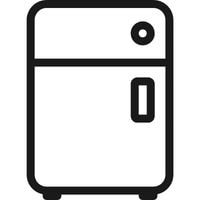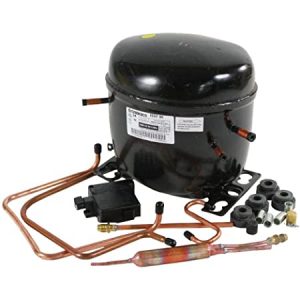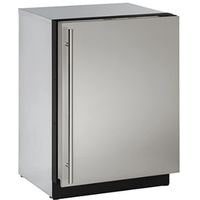U-Line Refrigerator Not Cooling. Your U-Line Refrigerator, not cooling might be caused by several reasons. One is malfunctioning components, specifically the compressor.
If the components of your model are failing to fit correctly or there is poor insulation, the chilling function will be compromised. Another reason could be if your system is using a refrigerant substance, such as Freon.
It might be low on gas or have an excessive build-up that could make your unit overheat. In this instance, consult a professional as soon as possible to avoid major damage and repair costs which can quickly add up.
U-Line Refrigerator Not Cooling
Why Does My U-Line Refrigerator Not Cool? If the compressor is not receiving enough power or if it’s overheating, the refrigerator will not have enough coolant to keep up with cooling and it won’t keep your food cold.
Door Seals Issue
While troubleshooting a refrigerator’s electrical components, it is important not to forget the door seals.
If the door seals are defective, cold air may escape and cause an imbalance in temperature between the interior and exterior of the refrigerator.
When that happens, the cooling process will not work properly. To test if the door seals are good, place a piece of paper in the doorway and pull it out in one fell swoop.
If there is resistance or if the paper refuses to pull out without effort even once then you know that replacement is needed.
Compressor Problem
Think of your heart like the compressor in your refrigerator. If something happens to your heart, then you may be at risk for serious health issues.
Similarly, if something goes wrong with the compressor attached to your refrigerator, it will not work and cool properly.
The compressor is what energizes the refrigerant and sends it to the condenser coils so if the compressor is bad, then a good indicator of that fact would be that this part isn’t functioning as well as it should.
Someone knowledgeable about compressors could do a continuity test to determine if you need to replace a said component or not.
Relay Start Fault
The start winding works in conjunction with the start relay to start the compressor. If the start winding is defective, the compressor might not run, may sometimes not run, or can’t start at all.
As a result, the refrigerator won’t be cold enough. To test if the start winding is defective, use a multimeter and test that it has continuity between its terminals called “Run” and “Start” sockets.
If your testing determines that it does not have continuity between these two terminals and you have a burnt odor, replace it.
Defective Start Capacitor
The start capacitor provides a boost of electricity to the compressor when it needs help during start-up. If the cap is bad, the compressor motor may not get cranky, and as a result, your fridge might be a little warm for your liking.
Testing with an ammeter will help you determine if you have a cold problem. If your fridge cooling mechanism is suffering from low voltage shock, then it’s time to do some recycling.
An issue with Main Control Board
The main control board may be the cause for the problem, but normally this is rarely the case. Before replacing any of your main control parts.
Test all of the most commonly defective components to make sure that none of those are defective. If you find out that none are, then it might be time to consider replacing the main control board!
Fans For Condensers
If the condenser fan motor is broken, it will stop working. To determine if the condenser fan motor is faulty, check to see if there are any obstructions in the fan blade first. Next, test to see if the fan blades spin freely when you turn them manually.
If there are no obstructions and the blades don’t spin freely then you’ll have to replace the condenser fan motor for it is faulty because there must be a problem with either its wiring or its rotor.
On the other hand, if there’s no problem with the rotor nor with its wiring, use a multimeter to test for continuity.
If there isn’t continuity, then this means that your condenser fan motor won’t work properly so you should then just go ahead and replace it immediately.
Thermistor Cause
A thermistor is a temperature-sensitive resistor used in applications such as household refrigerator controls. It measures temperature and feeds the data to a computer system. The control monitors the refrigerator conditions.
If it senses that any of the conditions are out of range, it will command the appropriate motor, compressor, or fan to turn on or off.
A defective thermistor could prevent the correct operation of these subsystems by not providing data when necessary, which would cause overwork for certain equipment.
To determine if the thermistor is defective, test it with a multimeter set to the appropriate resistance scale. The readings should correlate with refrigerator conditions at various points in time.
U-Line Refrigerator Not Cooling
Related Guides
